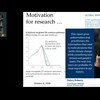greenhouse
Why are the home addresses of your friends causing greenhouse warming?
Kay Axhausen, ETH Zürich Transport planning has studied social networks as central element behind the location choice for residential locations and for leisure activities. The talk will introduce the o
Climate Change, Historical Emissions, and Unjust Benefits: A Comment on Axel Gosseries’ Account of Climate Justice
Journal of Practical Ethics Abstract One of the claims Axel Gosseries makes in What is Intergenerational Justice? is that greenhouse gas emissions produced before 1990 are morally unimportant for presen

Julia Steinberger: Is it possible to live well within planetary limits? Evidence and modelling from the LiLi project
Professor Julia Steinberger researches and teaches in the interdisciplinary areas of Ecological Economics and Industrial Ecology. Her research examines the connections between resource use (energy and
Power and future people’s freedom: intergenerational domination, climate change, and constitutionalism
"Power and future people’s freedom:intergenerational domination, climate change, and constitutionalism", Journal of Political Power, Volume 9, Issue 2, 2016, pp 289-307. Abstract Intergenerational domina
Joakim Kulin: Climate change or social change? Sociological perspectives on citizens’ environmental beliefs, attitudes, and behaviors
Joakim Kulin, Researcher at Department of Sociology, Umeå University.ABSTRACT It is increasingly evident that greenhouse gas emissions and global warming pose serious existential risks to human societi
Göran Duus-Otterström: Historical Emissions and Climate Justice
Senior lecturer Göran Duus-Otterström at the University of Gothenburg. ABSTRACT A common view in the discussion of climate change is that the polluter should pay. The costs associated with combatting cl

Göran Duus-Otterström
I received my PhD in political science from the University of Gothenburg 2008. Since 2021, I am a professor in the department of political science at the same university. I work on the theory of justi
The Case for Emissions Egalitarianism
Ethical Theory and Moral Practice, vol. 22, no 2., doi.org/10.1007/s10677-019-10016-8 Abstract There is a fixed limit on the greenhouse gas emissions that the atmosphere can absorb before triggering dang
Completed: Examining and overcoming the psychological barriers to climate action
This project's highly international and interdisciplinary collaboration will create synergies and develop important means to tackle climate change.
Still heating: Unfolding a typology of climate obstruction
In N. Marschner, C. Richter, J. Patz, & A. Salheiser (Eds.), Contested climate justice – Challenged democracy: International perspectives (pp. 59-71). Campus Verlag GmbH Abstract Earth is on a catastryet, there is little sign of halting the rise of global greenhouse gas emissions orstopping the extraction of fossil fuels. Against this background, in this articlewe re-engage with a recently proposed typology supposed to cover three modesthrough which effective climate action has been obstructed. These are, first,primary obstruction, that is, the spread of disinformation and/or denying the veryexistence of anthropogenic climate change. Second, secondary obstruction concernsmore or less deliberate obstruction via opposition to climate action and policiesvia, for example, reference to “the threat of deindustrialisation”. Finally, tertiaryobstruction denotes modes of living which, while not necessarily obstructingeffective climate change intentionally, concerns “living in denial”. Drawing onrecent research and examples, we revisit this typology.








